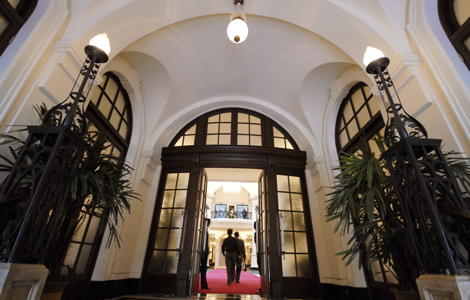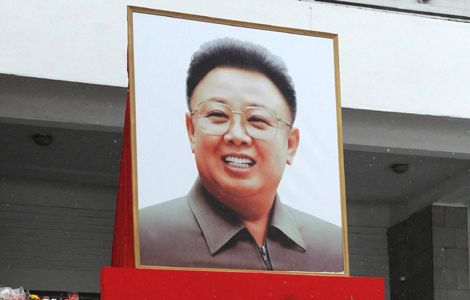China to keep reform moving
Updated: 2012-01-01 14:55
(Xinhua)
|
|||||||||||
BEIJING - Ye Wentao was worried about finding a new job when the tollbooth where he worked in Hefei, capital city of Anhui province, was closed three years ago in a national reform package.
"Laid off in my 40s, I couldn't see the way ahead," Ye said.
But fortunately for Ye, Anhui rolled out a string of reemployment policies at the same time as the reform, and he got a job working at a local highway overload management station. He now gets about the same salary as before.
Starting from January 1, 2009, China, after years of deliberation, introduced reforms in pricing, taxes and fees for refined petroleum products, raising fuel taxes while abolishing six fees charged for road or waterway maintenance and management.
The reform package was launched as a sweeping financial crisis left the global economy in recession and crude oil prices were dropping sharply.
The reform was successful and widely acclaimed, but Jia Kang, director of the Fiscal Science Research Center of the Ministry of Finance, knows it is anything but easy.
"The reform has to address various questions, ranging from raising taxes to handling the relations between the central and local governments, taking care of the interests of special groups like taxi drivers, improving the pricing mechanism of refined oil products, and resettling toll fees collectors," Jia said.
According to official statistics, the reform left 446,900 people to be resettled, and the work has been completed.
"After three decades of reform and opening up, such a reform with supporting measures in place has been of great significance," Jia said.
Since it initiated the reform and opening up more than 30 years ago, China has become the world's second largest economy and largest emerging market, and also the first developing country to reach the United Nations' Millennium Development Goal of halving its impoverished population ahead of schedule.
However, economic development is not the solution to all problems in the country.
Natural resources and the environment have imposed an increasing strain on economic growth; capabilities of scientific and technological innovation, as well as the current industrial structure, remain to be improved; public anxiety runs high over the widening wealth gap, food safety scandals, high housing and consumer prices, violence in land acquisition, and even the poor air quality in big cities.
It has occurred to many that the traditional mode of development has to be changed.
While addressing a gala commemorating the 90th founding anniversary of the Communist Party of China (CPC), President Hu Jintao said the reform should be deepened to tackle the country's outstanding problem of an imbalanced, uncoordinated and unsustainable development. TOP-LEVEL DESIGN HIGHLIGHTED IN REFORM
The year 2011 witnessed adjustments in home and consumer prices and individual income tax, with educational reform in full swing, and pension and medical insurance systems extended to cover the entire country.
Zou Dongtao, director of the China Institute for Development and Reform of the Central University of Finance and Economics, attributed the achievements in 2011 to the central authorities' previous work.
In October 2010, a proposal on formulating the 12th Five-Year Program (2011-2015) was issued, which called for "greater attention to the top-level design and overall planning of reform."
"The proposal of top-level design indicates that the top leadership will take more initiative in reforms and make policies in a more scientific way," Zou said.
He added reforms have been conducted in a resolute and prudent manner this year, and laid special emphasis on improving people's livelihoods.
The architect of China's reform and opening-up policy, late Chinese leader Deng Xiaoping, had a famous saying, "cross the river by touching the stones" when initiating the reform drive. Now, the top-level design concept indicates a significant change, Zou said. "Instead of groping forward, the government takes action with a clear plan in mind."
The State Council, or China's Cabinet, has recently promulgated a guideline on supporting Henan Province's efforts to speed up the development of the Central China Economic Zone that is centered in Henan and radiates to its adjacent areas.
According to the guideline, the primary task of the economic zone is to explore a way of coordinating industrialization, urbanization and modernization of agriculture without sacrificing agriculture and food, ecology and environment.
"Henan is a case in point showing that economic development at the cost of the environment and expansion of cities at the cost of farming have reached a dead end," said Zhang Jinbo, associate professor from Henan University of Economics and Law.
He added the guideline has taken into account all major problems the Central China Economic Zone may encounter.
A number of current reforms have resulted from social conflicts, said Wu Zhongmin, professor at the the Party School of the CPC Central Committee.
According to Wu, violent protests have led to changes in land acquisition policies, public outcry over extravagant government expenditures has led to more transparency of government budgets, and the melamine milk scandal led to reform to improve food safety.
"Social conflicts call for reforms, which cannot be overlooked, " Wu said.
Wu suggested the central authorities make a long-term timetable that includes all tasks in the country's reform and avoid no problems.
In addition, Wu said top-level design should be combined with experiments at or even below the provincial and municipal levels. MORE VIGOROUS REFORM
The year 2012 will be a crucial year in the implementation of the 12th Five-Year Program, and it will also witness the 18th National Congress of the Communist Party of China. The CPC leadership has called for outstanding economic and social progress to pave the way for a successful CPC congress.
It is agreed reform must be deepened in this regard.
In the past three decades, China's reform has focused on achieving an economic take-off through extensive economic growth, but it's time for a change, said Chi Fulin, executive director of the China (Hainan) Institute for Reform and Development.
Chi believes the reform in the future 5-10 years should focus more on transforming the economic growth mode and changing the economic structure.
Transforming the mode of economic development has set higher requirements for the reform and touched upon deeper conflicts of interest,Chi said. The reform will face challenges from various groups.
Premier Wen Jiabao has vowed to "be more resolute and courageous in pushing forward reforms in major areas and key links" during the 2011 legislative session.
China will work to achieve equality in distribution of income, and educational and medical resources so that the people will share in the fruits of reform and opening up, Wen said in March 2011.
For this purpose, economic and political restructuring are needed, according to Wen.
"The reform has to be conducted more vigorously," Wu said.
Wu added that the reform should also entail regulating the use of public power, promoting "proper and reasonable" democracy and strengthening public supervision.
"It requires determination and courage to regulate public power, for it will touch upon the vital interests of the organs of power, " Wu said. CLEARER PATH OF REFORM
China will seek stable and relatively fast economic growth next year amid the "extremely grim and complicated" global outlook, according to a statement issued after the annual central economic work conference earlier in December.
The main theme of next year's economic and social development will be "making progress while maintaining stability," the statement said.
"Stability means to maintain basically steady macro-economic policy, relatively fast economic growth, stable consumer prices and social stability," the statement said.
"To make progress, we must seize this strategically important development period to make new advances and breakthroughs in transforming China's economic development model, deepen reform and improve people's lives," it said.
China has sent out signals of more reforms under way to enhance people's livelihoods.
In the coming years, China will exert itself to promote employment, improve the basic medical insurance system that covers all residents, boost the reform in public hospitals, and push forward subsidized housing construction.
"More input in improving people's livelihoods will not only encourage consumption and help the country cope with the financial crisis, but also ease social conflicts and raise the government's credibility," Wu said.
China is also proceeding smoothly with the political restructuring.
J. Stapleton Roy, a former US ambassador to China, has written in an article that the idea that China's political system has remained frozen and that there have been no significant reforms to match those in the economic sphere is "nonsense."
"Political change in China has occurred on a vast scale, in a number of vitally important areas affecting the day-to-day existence of ordinary Chinese," Roy said in the article.
In the coming decade, China's reform should make consumption the intrinsic motive force of economic growth, ensure equality for the majority in sharing the fruits of economic development, maintain vitality and efficiency of the market and build a public-service-oriented government, Chi Fulin wrote recently in an article.
"The goal of the future reform should be equality and sustainable development," Chi said.
Hot Topics
Kim Jong-il, Mengniu, train crash probe, Vaclav Havel, New Year, coast guard death, Internet security, Mekong River, Strait of Hormuz, economic work conference
Editor's Picks

|

|

|

|

|

|







